Stan Brock never expected to see adults and children shivering in line in the middle of the night, hoping to get free medical, dental and vision care in the wealthiest country on earth. Now that he’s seen it for years, he’s no longer surprised. “It’s quite common,” he said. “People line up many, many hours before the event opens, which is normally at 5:30 in the morning.”
Brock is the founder of Remote Area Medical (RAM), an all-volunteer mobile medical clinic that’s been traveling to cities across the United States offering free health care since 1992. Brock founded RAM in 1985 to provide care to people living in the most remote areas of the Amazon rainforest. Seven years later, he was asked to bring the clinic to Knoxville, Tennessee. The invitations have since increased.
“You can close your eyes and stick a pin on the map of the United States and go there, and you’re gonna find people by the hundreds, and in many cases by the thousands, that need services,” said Brock.
“It’s simply unaffordable, particularly in dental and vision care. A very, very small percentage of people in this country have insurance that covers those two key items. We’re still seeing people dying of bad teeth in the United States,” he said. “I’d like to see us work ourselves out of a job so we can concentrate our efforts where we began, in places like the Amazon and Haiti, of course, but we’re bogged down here in the United States, I think, for years and years to come.”
I met Brock at RAM’s recent four-day clinic at the Oakland Coliseum, where they serve up to 800 patients a day and provided over $1 million in free services. It was their 663rd clinic. It takes about six months to raise the $175,000 to run the clinic, which is constantly buzzing with activity. At 3:30 AM, RAM volunteers give out 800 numbers. Whoever receives number 801 will have to come back that night and try again.
Sharon Williams, a 49-year-old former postal worker, stood in line at 11 PM, hoping to get her teeth examined. She was #153. Williams lost her job and her health insurance almost 12 years ago after she pulled her shoulder muscle while unloading a mail truck. “I’m still trying to get disability,” she said. “If it weren’t for family and friends, I would’ve lost everything.”
At RAM, Williams had an eye exam, got free glasses and acupuncture, saw a chiropractor, and had dental work. She hasn’t seen a dentist in over 12 years. “This is a beautiful thing. Where else would I be treated so well and find care like this?”
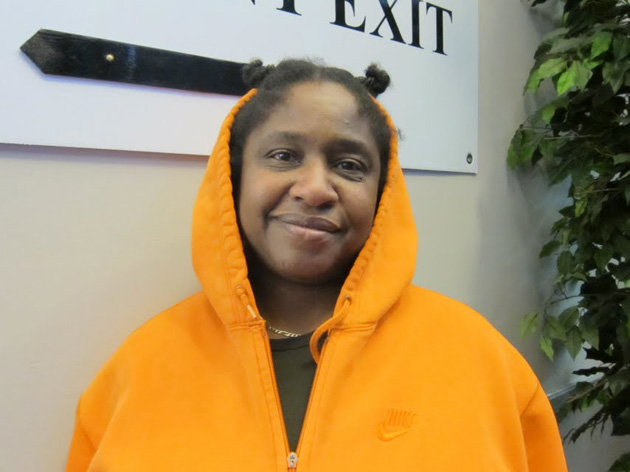 (Photos by Rose Aguilar)
(Photos by Rose Aguilar)
According to the Census Bureau, 49.9 million Americans, including 7.3 million children, don’t have health insurance. Even if the Supreme Court upholds the Affordable Care Act, 26 million people will still be uninsured, and costs will continue to rise, according to the Physicians for a National Health Program, an organization advocating a single-payer national health program.
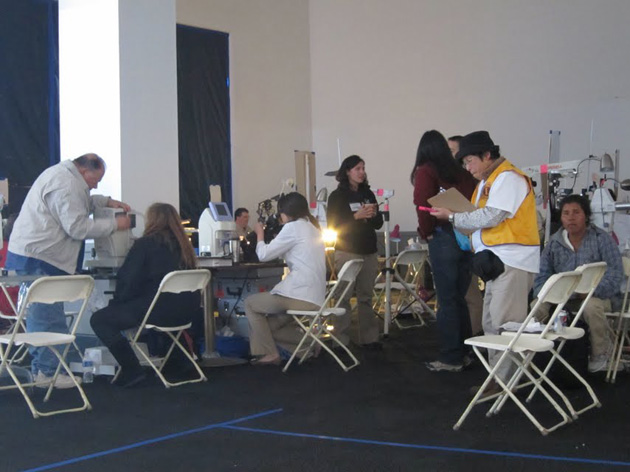
Gee McNeil, 19, and her mother, Tyra Manks, 54, stood in line at midnight to get dental and eye exams. They were #115 and #116. “I haven’t had my teeth cleaned in 13 years,” said Manks. “I’m on workman’s comp, but my insurance doesn’t cover dental and vision.”
“They had to take out my front tooth,” Manks continued. “It feels weird, but the pain is gone. I’m a diabetic, so they brought me fruit before I got drilled. I have to admit, I was crying. They really take care of you here. We’ve been here all day. I’m so thankful they’re here, but our priorities are messed up. I saw people with kids in line last night and it was cold outside. It’s so sad.”
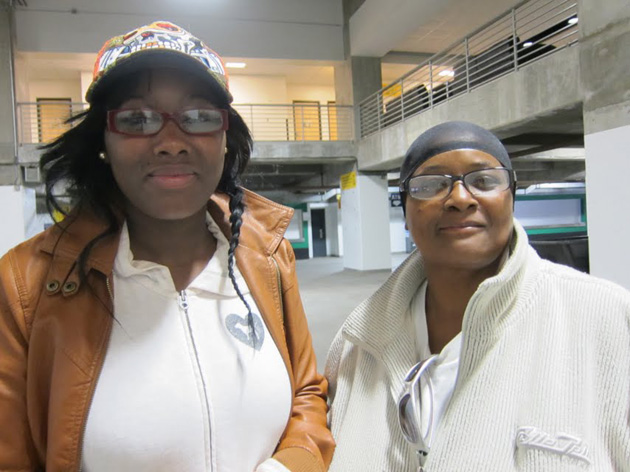
When I met Manks and McNeil, they were eagerly awaiting for their glasses to arrive. McNeil hasn’t had an eye exam since elementary school. “I used to sit in the front row at school because I couldn’t see the chalkboard,” she said. “My teachers used to say, ‘Tell your parents to buy you glasses.’ But we couldn’t afford glasses. My vision is always blurry. I can’t drive at night. I’m so excited. I can’t wait to put my glasses on.”
RAM wouldn’t be possible without dedicated volunteers like Doris Lum. Over the course of the few days she volunteered in the vision area, she met people who drove themselves to the coliseum even though they have horrible vision.
“Even in America, people can’t see. We’ve got the third world right here. We are seeing medical poverty in this country, and this is just the tip of the iceberg,” she said.
“This should be front-page news. The media come, take a photo, and leave. We need you to tell people’s stories. We need better health care for everyone right now.”
The volunteer doctors and dentists I met believe that when they get licensed, part of their obligation is to serve their community. According to Dr. Russell Webb, 32 dentists spent most of the day removing teeth. At last year’s clinics in Oakland and Sacramento, over 3,000 teeth were pulled. “That’s mostly due to neglect,” he said. “These clinics serve a dual purpose. We’re taking care of people, while also focusing on prevention. The sad reality is, most people don’t have dental insurance, so prevention is difficult. We’re fighting like crazy to make dental care a priority in this country.”
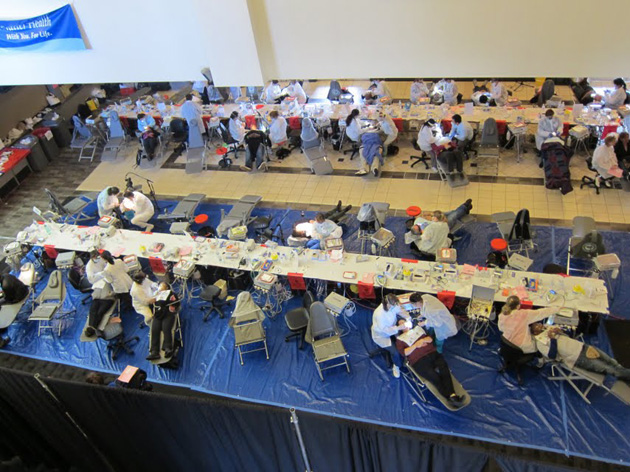
Dr. Webb said the clinic could have used even more dentists, but most of his dentist friends have seen their appointment schedule drop by about 40 percent because of the economic crisis. “The economy is hitting them hard and even they are struggling to survive.”
When Dr. Don Rollofson arrived to volunteer, he expected to be working on mostly homeless people. “What we found was the exact opposite,” he said. “Way over half of these patients are working. The other half would like to be working. They used to have preventative care, and now they don’t. This is a real problem.”
The large area where sports fans usually wait in line to buy beer and peanuts has been transformed into a fast-paced dental clinic filled with dentists, hygienists, trays, equipment, about 100 chairs and a very busy sterilization area.
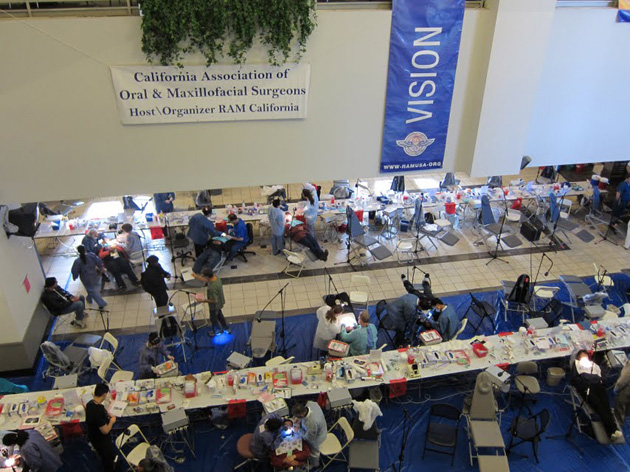
When Paul worked for FedEx, he had preventative care. Then he got laid off. Since 2009, he’s worked on and off as a part-time janitor. “It’s been so hard to find a job,” said Paul. “I’m also dealing with a mental disability, so I have Medicare, but it doesn’t cover dental or vision. I haven’t had my teeth cleaned in ten years.”
At 3:30 AM, Paul got ticket #599. “It was really cold out there,” he said. When I met Paul, he just had his teeth cleaned and was waiting to get a few fillings. He has bad vision, so he got a ticket to come back at 5 AM the next day to get an eye exam and free glasses.
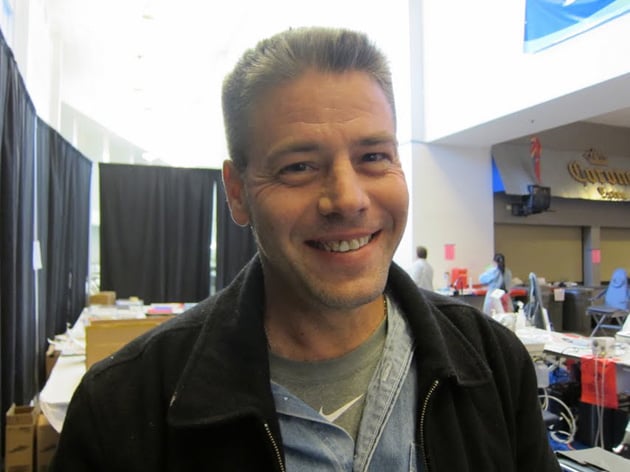
Deborah Dean, #695, got in line at around midnight. She spent 17 years as an addiction counselor. Then she got sick. She has diabetes and high blood pressure, and has had several heart attacks. She’s living on Social Security and disability, which amounts to $950 per month. “Trying to live off of that and save is ridiculous,” she said.
Dean has been in desperate need of dental care for months, but Medicare doesn’t cover dental. “I’ve had headaches and haven’t been able to eat,” she said. “I’ve gone to dentists, but they want $1,500 to take care of one tooth. I can’t afford that, so the pain continues.”
“This is a lifesaver,” said Dean. She got a full mouth X-ray, an intense cleaning and three fillings. She’s been to several dentists who wanted to remove her teeth. The dentist she saw at the RAM clinic saved them.
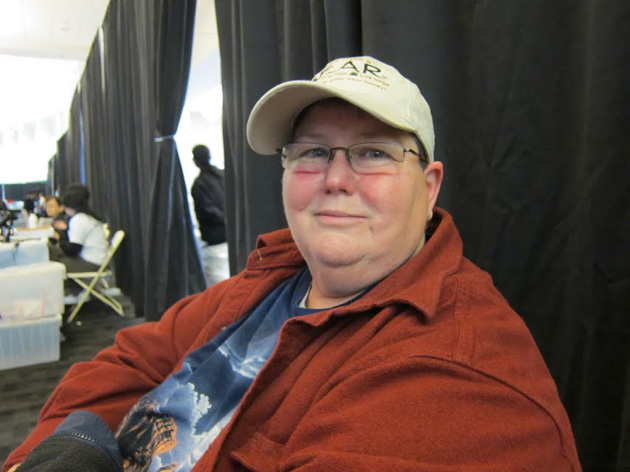
On my way out, I met Cathy DiFrancesco, a dental hygienist who coordinates the volunteers in the dental area. “There are so many underserved people. It’s just overwhelming,” she said.
“And you just want to come back. I’ve had hygienists say, ‘Can I come back tomorrow?’ They’re exhausted. They’ve worked 12-hour shifts and they still want to give.”
“The patients cry,” said DiFrancesco. “They hug you. They’re so appreciative of what we’re doing. It makes it worth coming back.”
A hygienist who recently lost her job and can’t afford a hotel room drove three hours to volunteer. Another hygienist arrived at 3:30 after he got off work. “Many of us show up at 6 and we’re here until 6,” said DiFrancesco.
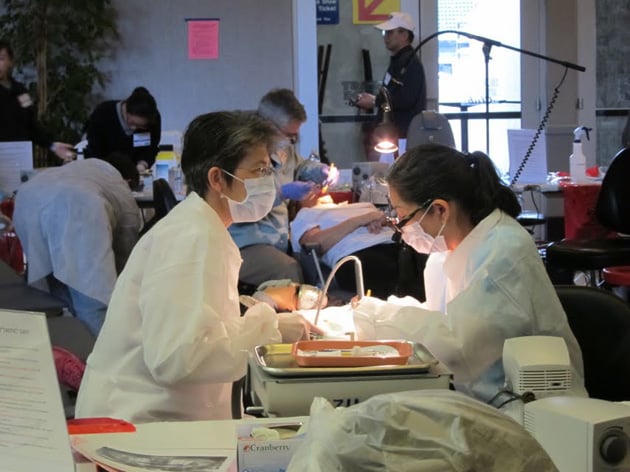
They treat everyone from a 13-year-old who had a huge infection between her two front teeth to a man who had a possible cancerous lesion on the top of his mouth. He thought it was a burn. Both patients were told to make follow-up appointments with Highlands Hospital, one of the only hospitals in the area that will treat the uninsured.
“You’re just so thankful that they stood in line for 12-plus hours to get in,” said DiFrancesco. “What if they had given up? What if they had said, ‘This is too much. I can’t wait any longer.’ It’s patients like that. You just keep going because you know that they need the care.”
“It’s the heart of a hygienist to serve the underserved and this is where the rubber meets the road,” said DiFrancesco. “RAM provides this opportunity for us. Without them, we couldn’t be doing this.”
When I left the clinic at 6:30 PM, I was shocked to see a line already forming outside. It looked like people were tailgating before a football game. There was a line of chairs, blankets, coolers, food and a few tents for children.
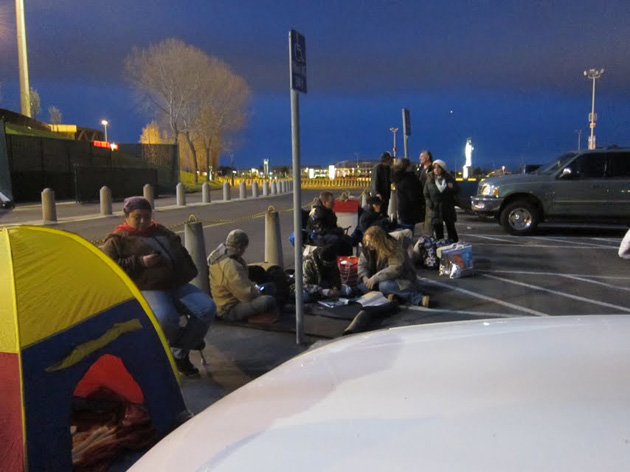
Dan Parker, 49, was the first person in line. He arrived too late to get a number at 3:30 AM, so he decided to get in line at 3:30 PM. Like the majority of the people in line, he needs dental work. He never thought he’d need free health care, but in 2009, he got in a head-on collision and lost everything. He used his life savings to pay for medical bills and is now on a $938 monthly fixed income.
“I had to go on welfare and food stamps. I didn’t want to do it, but I had no choice,” he said. “I’m living in my van to save money to start a business. I’m lucky I’m alive. Some things are just out of your control.”
Tali Lata got in line at 6 PM. He’s saving a spot for his daughter, brother, uncle, nieces and nephews. They all need dental work and eye exams. Lata has been in the construction business for the past ten years, but finding a job has been close to impossible. “It’s crazy,” he said. “I’m about to sell all of my tools just to get by. I could barely get work last year. I don’t see it coming back. I might move to Alaska to be with family.”
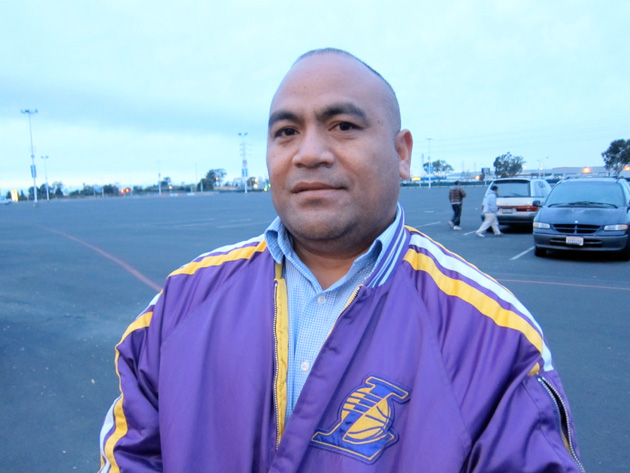
Jesus Suarez, 28, also used to work in construction and paint houses. He currently makes $180 a week selling and recycling cans, bottles, metal and used appliances. “I can’t find a job. It’s very sad. I haven’t had my teeth cleaned in four years. I’m also hoping to get a physical.”
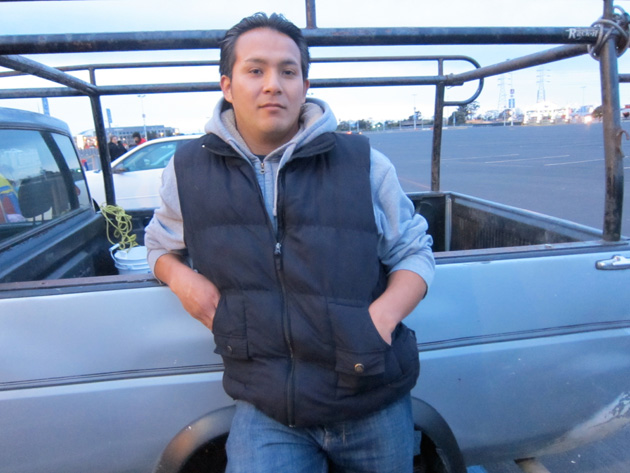
Rosemary Brown, 55, and her daughter Teona Lewis, 28, stood in line at 1 AM, but could barely stay awake, so they left at 7 AM to sleep. They got back in line at 7 PM. Brown has a seasonal job as a ride operator for a company that contracts out to local carnivals. She also parks cars and does clean-up work. When the carnival comes to town, she makes $325 for up to 70 hours a week and has no health insurance.
Lewis works part-time for the state of California, but wants full-time work. Since her last teeth cleaning seven years ago, one tooth has fallen out, and she’s in constant pain. “I have health insurance, but it doesn’t cover dental,” she said. “I feel like this makes no sense. You shouldn’t have to stand in overnight lines for treatment. There should be basic care for everyone.”
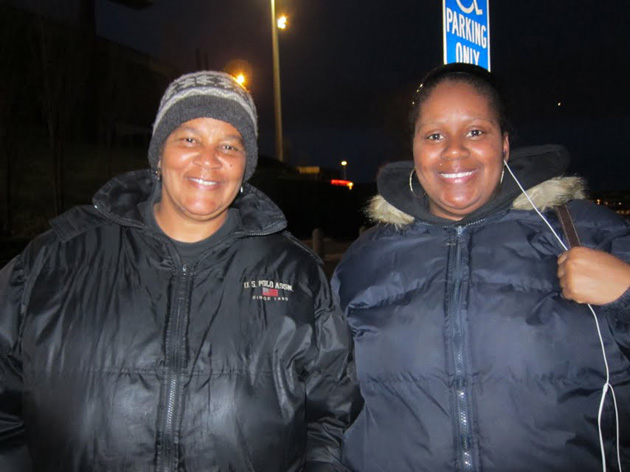
Lisa Jones, 38, has been a substitute teacher for five years. She needs a dental exam and new glasses. “Subs don’t get health insurance. They just formed a union, so hopefully we’ll get paid vacation and wage protections,” she said.
“A lot of people I know don’t have insurance,” said Jones. “They call themselves the working poor. I’m the working poor and I teach kids who have emotional-behavioral disorders. I love teaching those kids because you have to be creative with your presentations.”
Ron McInitre, 59, has spent 26 years as a substitute teacher. He teaches just about every subject to middle- and high-school students and yet, he’s never had health insurance. “I have a masters degree in therapy. It’s wrong. We have no unemployment or paid vacation,” he said. “Our society only cares about money. We need universal health care.”
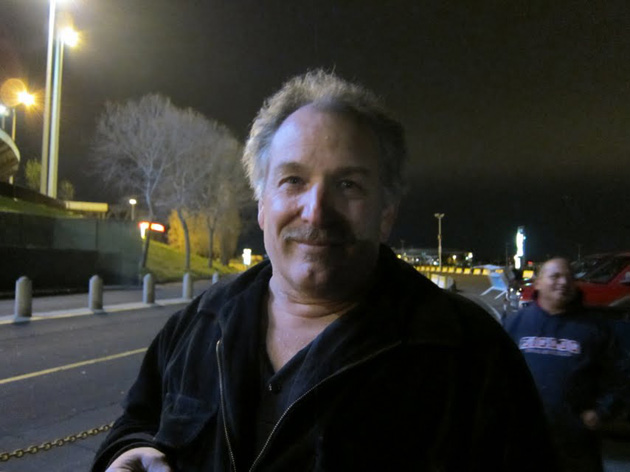
Nancy Paint, 55, is a caregiver who has “lousy” health insurance. “I have to save money to go to the doctor,” she said. “I had to save for four months to get a CAT scan.”
She’s hoping to get a physical and dental exam. “I’m a caregiver. I have to stay healthy or I can’t take care of my patient. He’s a 43-year-old man who has the brain capacity of a six-year-old. You do what you have to do. I can’t get sick.”
Art Rice, 48, is an unemployed plumber. He arrived at 10 AM, not realizing that in order to get a number, you have to get in line at midnight at the latest. So, he returned at 7 PM. Like so many of the people I met, he can’t find work.
“I’ve been going to the unemployment office. I used to do plumbing for new homes. There are no more new homes in my area. There’s nothing out there,” he said. “My savings is now gone. Family members are helping. They gave me gas money to get here. I’m not starving, but it’s hard. I’m lucky my family feeds me.”
Rice has had tooth pain and reading issues for months. He’s hoping to have a dental exam and get a pair of free glasses.
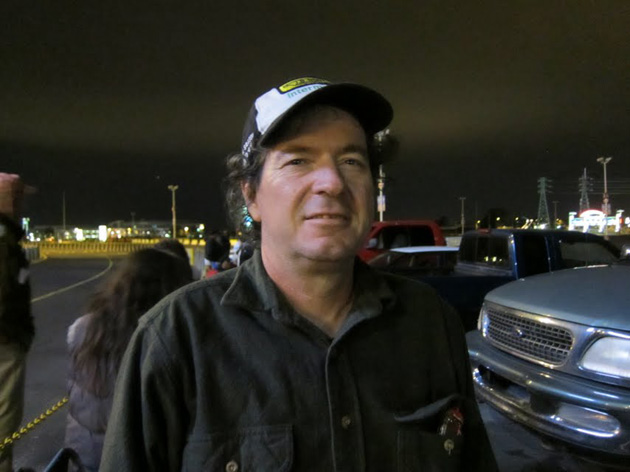
At around 9:30 PM, just minutes before I left, a RAM volunteer approached the line of people to make an announcement. “Can I have your attention, please? How many of you are here for eye exams?” Several hands went up.
“I’m very sorry, but we can’t see you tomorrow. All of the slots have been taken. You can try again tomorrow night or go to our clinic in Sacramento next week.”
Those in line for vision stared at him and said nothing. Most of them decided to spend the night in line to have dental exams.
Because there’s so much demand, RAM California was incorporated in September 2011. Its president, Pamela Congdon, hopes to raise enough money to buy 20 dental chairs and a vision lab. “The plan is to run clinics on the weekends and in rural areas,” she said. “The need is so great.”
RAM also has affiliates in Kentucky and Oklahoma. Future clinics are planned for Bristol, Tennessee; Sewanee, Tennessee; Pikeville, Kentucky; and Wise County, Virginia. There is clearly no end in sight.
Angry, shocked, overwhelmed? Take action: Support independent media.
We’ve borne witness to a chaotic first few months in Trump’s presidency.
Over the last months, each executive order has delivered shock and bewilderment — a core part of a strategy to make the right-wing turn feel inevitable and overwhelming. But, as organizer Sandra Avalos implored us to remember in Truthout last November, “Together, we are more powerful than Trump.”
Indeed, the Trump administration is pushing through executive orders, but — as we’ve reported at Truthout — many are in legal limbo and face court challenges from unions and civil rights groups. Efforts to quash anti-racist teaching and DEI programs are stalled by education faculty, staff, and students refusing to comply. And communities across the country are coming together to raise the alarm on ICE raids, inform neighbors of their civil rights, and protect each other in moving shows of solidarity.
It will be a long fight ahead. And as nonprofit movement media, Truthout plans to be there documenting and uplifting resistance.
As we undertake this life-sustaining work, we appeal for your support. Please, if you find value in what we do, join our community of sustainers by making a monthly or one-time gift.